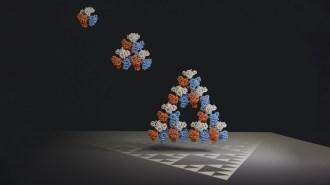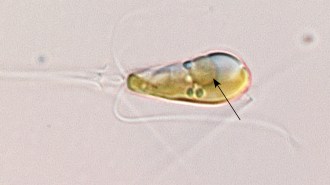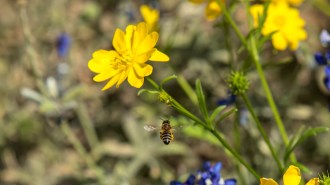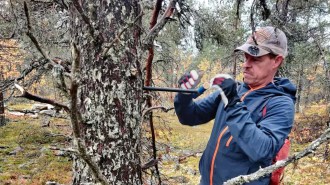News
-
 Math
MathScientists find a naturally occurring molecule that forms a fractal
The protein assembles itself into a repeating triangle pattern. The fractal seems to be an accident of evolution, scientists say.
-
 Animals
AnimalsIn a first, these crab spiders appear to collaborate, creating camouflage
Scientists found a pair of mating crab spiders blending in with a flower. The report may be the first known case of cooperative camouflage in spiders.
-
 Life
LifeThis marine alga is the first known eukaryote to pull nitrogen from air
An alga’s bacterial symbiote has evolved into an organelle that turns atmospheric nitrogen into ammonia, making the alga unique among eukaryotes.
By Jake Buehler -
 Space
SpaceHow a sugar acid crucial for life could have formed in interstellar clouds
Computer calculations and lab experiments have revealed a possible mechanism for the creation of glyceric acid, which has been seen in meteorites.
-
 Health & Medicine
Health & MedicineTeens are using an unregulated form of THC. Here’s what we know
The compound is called delta-8-THC and, like delta-9-THC in marijuana, comes from the cannabis plant and may hurt teens’ brains.
-
 Health & Medicine
Health & MedicineImmune cells’ intense reaction to the coronavirus may lead to pneumonia
Immune cells that patrol lung tissue may play a role in the progression of a coronavirus infection to pneumonia, lab studies show.
-
 Ecosystems
EcosystemsFlowers may be big antennas for bees’ electrical signals
The finding suggests a way for plants to share information about nearby pollinators and communicate when to trigger nectar production.
-
 Health & Medicine
Health & MedicineA protein found in sweat may protect people from Lyme disease
The protein stopped Borrelia burgdorferi, a bacterium that is transmitted by ticks, from growing in dishes or infecting mice.
-
 Earth
EarthPolar forests may have just solved a solar storm mystery
Spikes of carbon-14 in tree rings may be linked to solar flares, but evidence of the havoc-wreaking 1859 Carrington event has proven elusive until now.
-
 Space
SpaceDuring the awe of totality, scientists studied our planet’s reactions
Earth’s atmosphere was a big area of focus for scientists studying the total solar eclipse on April 8, 2024.
By Adam Mann -
 Environment
EnvironmentHeat waves cause more illness and death in U.S. cities with fewer trees
There are usually fewer trees in neighborhoods with higher populations of people of color. Planting trees could save hundreds of lives every year.
By Jude Coleman -
 Science & Society
Science & SocietyYour last-minute guide to the 2024 total solar eclipse
From getting eclipse glasses to checking your weather, we’ve got you covered to help you enjoy this incredible solar eclipse.
By Karen Kwon